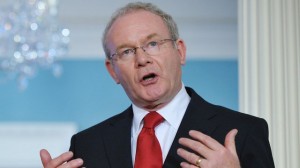
Come la Rivolta di Pasqua del 1916 ha segnato la fine dell’impero britannico, l’Accordo del Venerdì Santo ha segnato la fine dell’unione britannica, ha spiegato McGuinness in una lettura presso la London School of Economics.
“Il ruolo del Segretario di Stato continua a diminuire, e giustamente, secondo me.
“È tempo di una seria conversazione sul bisogno dell’esistenza del NIO e del ruolo di Segretario di Stato”, ha affermato.
“Per me la rimozione del NIO e della posizione di Segretario di Stato e il trasferimento dei rimanenti poteri porterebbe una notevole fiducia nelle nostre istituzioni politiche e nel processo di pace, oltre ad essere un importante risparmio per lo Scacchiere”, ha aggiunto.
McGuinness chiede con insistenza alla popolazione in Gran Bretagna di unirsi per cambiare la politica governativa inglese nell’unione.
Secondo il vice primo ministro non si tratta di provocare o fare esercizio di retorica, ma come avvenne negli anni antecedenti e seguenti alla Prima Guerra Mondiale, “adesso stiamo vivendo un periodo simile di enorme cambiamento – ovviamente non drammatico come 100 anni fa, ma sempre un cambiamento significativo”.
“In termini costituzionali, se la Rivolta ha segnato l’inizio della fine dell’impero come la gente lo conosceva, è un mio credo che l’Accordo del Venerdì Santo ha segnato la fine dell’unione come la conoscevamo”, prosegue McGuinness.
La sua convinzione è stata rinforzata e confermata non solo da quanto sta avvenendo in Irlanda, ma anche dagli eventi come la richiesta di indipendenza della Scozia e una maggiore autonomia del Galles. “Il tessuto costituzionale dello Stato britannico è stato cambiato per sempre”, continua.
“Sono assolutamente legato al processo di pace e a quello politico”, ha aggiunto. “Un’Irlanda unita ha senso. In molti modi il progresso politico del Nord degli ultimi anni ha livellato il campo di gioco della politica per i nazionalisti e repubblicani, che possono dire per la prima volta da una posizione paritaria che un’Irlanda unita è un imperativo politico ed economico”, rivela McGuinness.
Per il politico dello Sinn Fein, il dibattito non dovrebbe essere confinato all’Irlanda. “C’è un ruolo per la popolazione in Gran Bretagna: diventare persuasori per l’Irlanda unita”.
“Questa sera chiedo a tutte le persone in Gran Bretagna di diventare le voci di un’unione alterata, per un’Irlanda unita, in pace con sé stessa e con i propri vicini, compresa l’Inghilterra”.
Tratto da Irish Times
SF questions need for Northern Ireland Office
Just as the 1916 Rising marked the end of the British empire, the Belfast Agreement of 1998 marked the end of the British union, Mr McGuinness argued in a lecture at the London School of Economics.
“The role of the British secretary of state continues to diminish, and rightly so, in my view.
“It is time for a serious conversation on whether there is a need for the NIO and the secretary of state job to exist at all,” he said.
“It is my view that the removal of the NIO and the secretary of state position and the transfer of remaining powers would be a massive vote of confidence in our political institutions and the peace process, as well as a massive saving to the exchequer,” he added.
Mr McGuinness urged people in Britain to lobby for a change in British government policy on the union.
He said he wasn’t being provocative or engaging in rhetoric but he believed that similar to the years preceding and following the first World War, “we are now living through a similar period of massive change – obviously not as dramatic as 100 years ago, but significant change nonetheless”.
“In constitutional terms, whereas the Rising marked the beginning of the end of the empire as people knew it, it is my belief that the Good Friday agreement marked the end of the union as we know it,” he said.
He said his belief was strengthened and confirmed not just by what was happening in Ireland, but also by events elsewhere such as the demand for Scottish independence and greater Welsh autonomy. “The constitutional fabric of the British state has been changed and changed forever,” he said.
“I am also absolutely wedded to the political and peace process,” he added. “A united Ireland makes sense. In many ways the political progress in the North over recent years has levelled the political playing field for nationalists and republicans to argue for the first time ever from a position of equality that Irish unity is a political and economic imperative,” he said.
Mr McGuinness said the debate should not be confined to Ireland. “There is a role for people in Britain to become persuaders for Irish unity,” he said.
“Tonight I call on all those in Britain to become voices for an altered union, a union without Ireland, for a united Ireland, at peace with itself and its neighbours, including Britain.”